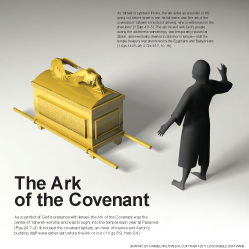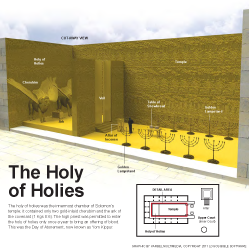6:1–7 Isaiah’s throne-room vision of Yahweh changes the way he represents God’s sovereignty and glory in the rest of the book. The placement of this account six chapters into the book may indicate that it is not Isaiah’s initial commissioning as a prophet of God (compare Ezekiel’s vision of Yahweh in Ezek 1), but rather his commissioning for a special task or mission. This fits the specific message he is given in Isa 6:9–10. Alternatively, chs. 1–5 may be a prologue to the book as a whole; those chapters introduce key ideas and themes present throughout chs. 1–66. In that case, the vision in ch. 6 could be an account of Isaiah’s initial prophetic commissioning—a common motif in God’s interactions with the prophets (see Exod 3 or Ezek 1). |
 Prophetic Commissioning and the Divine Presence
Prophetic Commissioning and the Divine Presence
6:1 In the year of the death of Uzziah the king Uzziah probably died around 740 bc. Isaiah 1:1 says Isaiah was active in the reign of Uzziah, but Uzziah may only be included there because Isaiah’s ministry began in the last year of Uzziah’s life.
sitting on a high and raised throne Isaiah sees the heavenly throne room of Yahweh. The Israelites understood the temple in Jerusalem to be Yahweh’s earthly dwelling. Thus, Isaiah’s vision links Yahweh’s heavenly throne with His divine residence in the temple (compare Psa 11:4; Isa 66:1).
high and raised Distinctive of Isaiah’s depiction of Yahweh throughout the book as the only one who should be exalted (see 2:11) or deserves to be “high and lifted up.” The exact phrasing occurs again in 52:13 and 57:15.
the hem of his robe With God on His throne in heaven, the temple only contains the very bottom of God’s robe. The Hebrew here refers to the edge of the skirt or hem.
6:2 Seraphs These heavenly beings attending to Yahweh are only mentioned here. Their name is derived from a Hebrew term that indicates some sort of serpent. The related Hebrew verb denotes burning, so the seraphim are sometimes considered fiery serpents. Ancient Egyptian art includes images of winged serpents; these serpents, however, do not have six wings.
Each had six wings Spiritual beings are often depicted with sets of wings. The cherubim in Ezek 1 have four wings each. The greater number of wings of the seraphim may indicate their higher status in the heavenly hierarchy.
two he covered his face The seraphim likely had to protect themselves from the brightness of the glory of Yahweh. In Ezek 1, the cherubim fly with two wings and cover their bodies with the other two. The seraphim cover their bodies with four wings and fly with two.
6:3 Holy, holy, holy The threefold repetition intensifies the superlative. For example, the “holy of holies” is the holiest part of the temple (the most holy place).
whole earth is full of This line is often translated as a statement, “the whole earth is full of His glory,” but it could also be translated as an invocation, “may His glory fill the whole earth”—looking ahead to the ultimate fulfillment of Yahweh’s visible earthly reign (see Isa 11:9 and Psa 72:19).
his glory The glory of Yahweh is His visible earthly presence. Isaiah’s vision recalls a past time in Israel’s history when Yahweh was visibly present among them (see Exod 16:7–10; 29:43; 40:34–35; 1 Kgs 8:11; Psa 26:8; 63:2).
6:5 Woe to me Appearing improperly before a king could lead to death. Isaiah is unprepared, which intensifies the situation. See Exod 33:20; Esth 4:11.
6:7 has removed your guilt Isaiah is cleansed of sin so that he can remain in the divine presence and live to tell about it.
is annulled Atonement achieved a ritual cleansing of sin, usually by means of blood sacrifice. The Hebrew word used here can mean covering over or wiping away. Atonement restores the relationship between God and sinners. Isaiah’s atonement without sacrifice illustrates God’s freedom to extend mercy by His grace (see Exod 33:19).
6:8–13 Isaiah is now ready to receive the divine message, or at least to overhear the deliberations in the divine council. |
6:8 who will go for us? The biblical descriptions of God’s heavenly deliberations often include a plural address. The plural can be understood most simply as God addressing the divine beings present in His throne room, and asking them a rhetorical question—knowing Isaiah will respond. A mark of a true prophet was that he had stood in the divine council and received his mission directly from God. See Gen 1:26 and note; Jer 23:18; 1 Kgs 22:19–23.
and received his mission directly from God. See Gen 1:26 and note; Jer 23:18; 1 Kgs 22:19–23.
6:9–10 God orders Isaiah to make sure the people do not repent and thus avoid judgment. The prophet is essentially being asked to allow the people to continue along the same path of disobedience they have been on. Acceptance of God’s message and true repentance only comes if God wills it. The passage is quoted numerous times in the nt to support the general lack of a positive response among the Jewish people to Jesus as the Messiah. See Matt 13:14–15; John 12:40; Acts 28:25–29. |
6:11–13 Until when, Lord? Isaiah is dismayed at the message and wonders when it will end. Essentially, judgment is now inevitable; God must follow through on the punishment that they deserve.
6:12 Yahweh sends the people far away Destruction and exile are the instruments of God’s judgment.
6:13 even if only a tenth part remain A hint that a small group of people will survive. From that remnant, God will rebuild His people. But they will still experience and suffer through the judgment. See note on Isa 1:9.
The seed of holiness will be her tree stump A foreshadowing of the messianic promise of 11:1. The messiah will come from the remnant of Israel and fulfill Israel’s obligation to the covenant in a way that they never could.

|
About Faithlife Study BibleFaithlife Study Bible (FSB) is your guide to the ancient world of the Old and New Testaments, with study notes and articles that draw from a wide range of academic research. FSB helps you learn how to think about interpretation methods and issues so that you can gain a deeper understanding of the text. |
| Copyright |
Copyright 2012 Logos Bible Software. |
| Support Info | fsb |
 Loading…
Loading…



